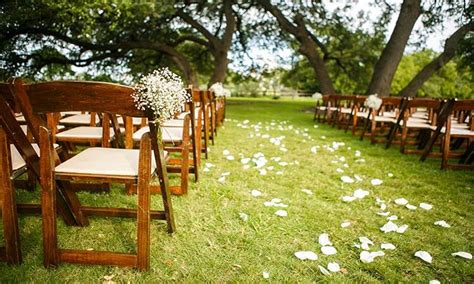How To Start A Wedding Venue On Your Property
Ronan Farrow
Apr 02, 2025 · 3 min read

Table of Contents
How to Start a Wedding Venue on Your Property: A Comprehensive Guide
Starting a wedding venue on your property can be a rewarding venture, blending your passion for hospitality with the beauty of your land. This guide will walk you through the essential steps, from initial planning to grand opening.
1. Assess Your Property & Resources
Before diving in, honestly evaluate your property's suitability. Consider:
Space and Capacity:
- Size: How many guests can your property comfortably accommodate? Consider ceremony space, reception area, parking, and potential overflow areas. Will you be able to handle large or small weddings?
- Layout: Is the layout conducive to a wedding? Is there a natural flow between ceremony and reception areas? Is there adequate space for vendors (caterers, photographers, DJs)?
- Accessibility: Is the venue accessible for guests with disabilities? Are there sufficient pathways and ramps?
Aesthetics and Ambiance:
- Natural Beauty: Does your property possess inherent charm? Stunning landscapes, unique architecture, or historical significance can significantly enhance its appeal.
- Ambiance and Style: What kind of weddings does your property best suit? Rustic, elegant, modern, or something else? Defining your niche will attract the right clientele.
- Photographic Opportunities: Identify picturesque locations on your property perfect for capturing memorable wedding photos.
Legal and Regulatory Compliance:
- Zoning Laws: Verify your local zoning laws and regulations concerning commercial activities and event venues. You might need special permits or variances.
- Building Codes: Ensure your property complies with all relevant building codes and safety regulations, particularly concerning capacity, fire safety, and accessibility.
- Insurance: Secure adequate liability insurance to protect yourself from potential risks and lawsuits.
2. Develop a Business Plan
A solid business plan is crucial for success. It should include:
Market Research:
- Competition: Analyze your local competition. What are their strengths and weaknesses? How can you differentiate yourself?
- Target Market: Identify your ideal client. Are you targeting luxury weddings, budget-friendly celebrations, or a specific niche (e.g., rustic, eco-friendly)?
- Pricing Strategy: Determine your pricing structure based on your costs, market rates, and desired profit margin.
Financial Projections:
- Start-up Costs: Calculate all initial expenses, including permits, renovations, insurance, marketing, and initial operating costs.
- Operating Expenses: Estimate ongoing costs like utilities, maintenance, staffing, and marketing.
- Revenue Projections: Forecast your expected revenue based on your pricing, occupancy rates, and anticipated number of weddings.
Marketing and Sales Strategy:
- Branding: Create a strong brand identity that reflects your venue's unique character and style.
- Website: Develop a professional website with high-quality photos and detailed information about your venue.
- Marketing Channels: Identify effective marketing channels, such as social media, wedding websites, local partnerships, and public relations.
3. Prepare Your Property
Transforming your property into a wedding venue may involve:
Renovations and Improvements:
- Essential Upgrades: Address any necessary repairs or renovations to ensure the venue is safe, functional, and aesthetically pleasing.
- Landscape Enhancements: Enhance your property's beauty through landscaping, lighting, and other aesthetic improvements.
- Infrastructure: Ensure you have adequate parking, restrooms, power, water, and waste disposal facilities.
Furnishing and Decor:
- Essential Furniture: Acquire necessary furniture, including tables, chairs, linens, and other essential items.
- Decorative Elements: Add decorative elements that enhance the ambiance and align with your venue's style.
- Accessibility Features: Install necessary ramps, accessible restrooms, and other features to accommodate guests with disabilities.
4. Obtain Necessary Permits and Licenses
Before accepting bookings, secure all required permits and licenses. This process varies by location, so consult with your local authorities.
5. Launch and Market Your Venue
Once your property is ready, launch your marketing efforts and start accepting bookings. Continuously monitor your progress, adapt your strategies as needed, and strive to provide exceptional service to build a strong reputation.
Starting a wedding venue is a significant undertaking, requiring careful planning, dedication, and a passion for creating unforgettable experiences. This guide provides a solid framework for your journey. Remember to consult with professionals like lawyers and accountants for expert advice throughout the process.
Featured Posts
Also read the following articles
| Article Title | Date |
|---|---|
| How To Treat Rough Cut Lumber For Indoor Use | Apr 02, 2025 |
| How To Survive As A Player Chapter 8 | Apr 02, 2025 |
| How To Ride A Bike In A Dress | Apr 02, 2025 |
| How To Test A Golf Cart Charger | Apr 02, 2025 |
| How To Remove Valve Stem Seal | Apr 02, 2025 |
Latest Posts
-
How Can I Get A Work Permit In South Africa
Apr 03, 2025
-
How Can I Get A Speeding Ticket Reduced
Apr 03, 2025
-
How Can I Get A Free Government Phone In Florida
Apr 03, 2025
-
How Can I Find Out If A Motorcycle Is Stolen
Apr 03, 2025
-
How Can I Boost My Cell Signal In Rural Areas
Apr 03, 2025
Thank you for visiting our website which covers about How To Start A Wedding Venue On Your Property . We hope the information provided has been useful to you. Feel free to contact us if you have any questions or need further assistance. See you next time and don't miss to bookmark.
